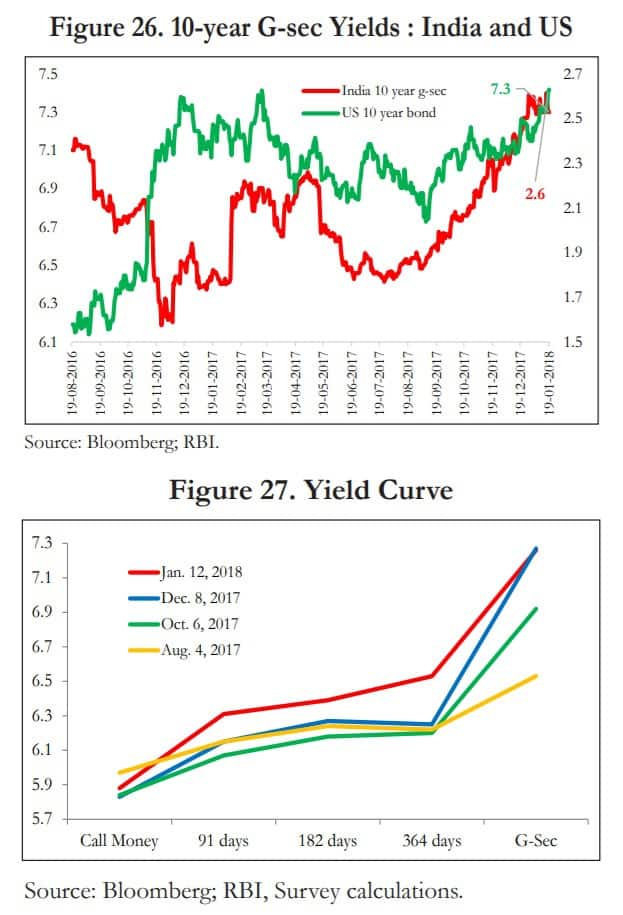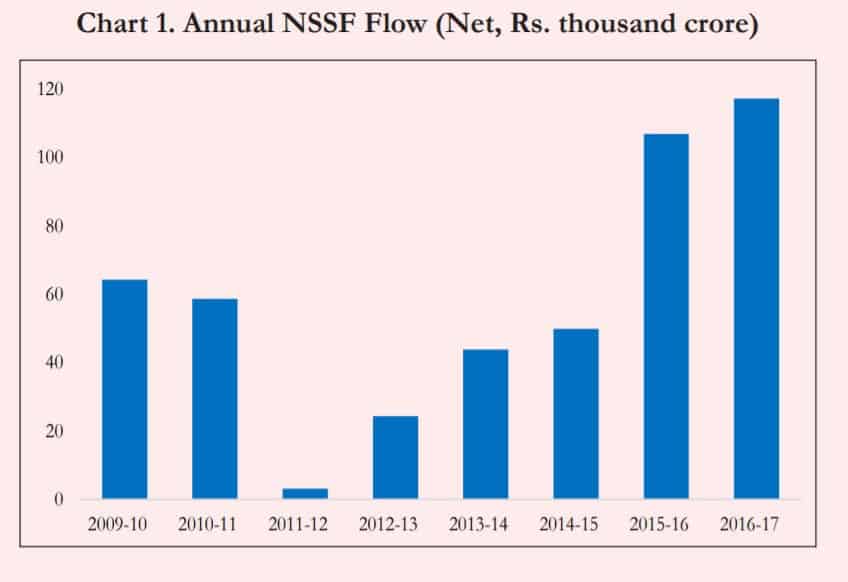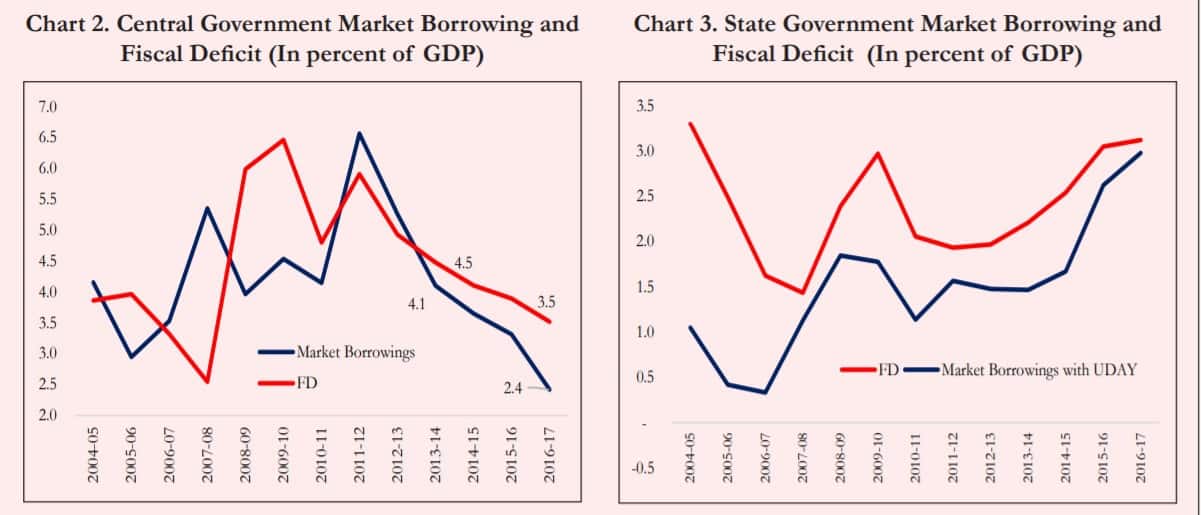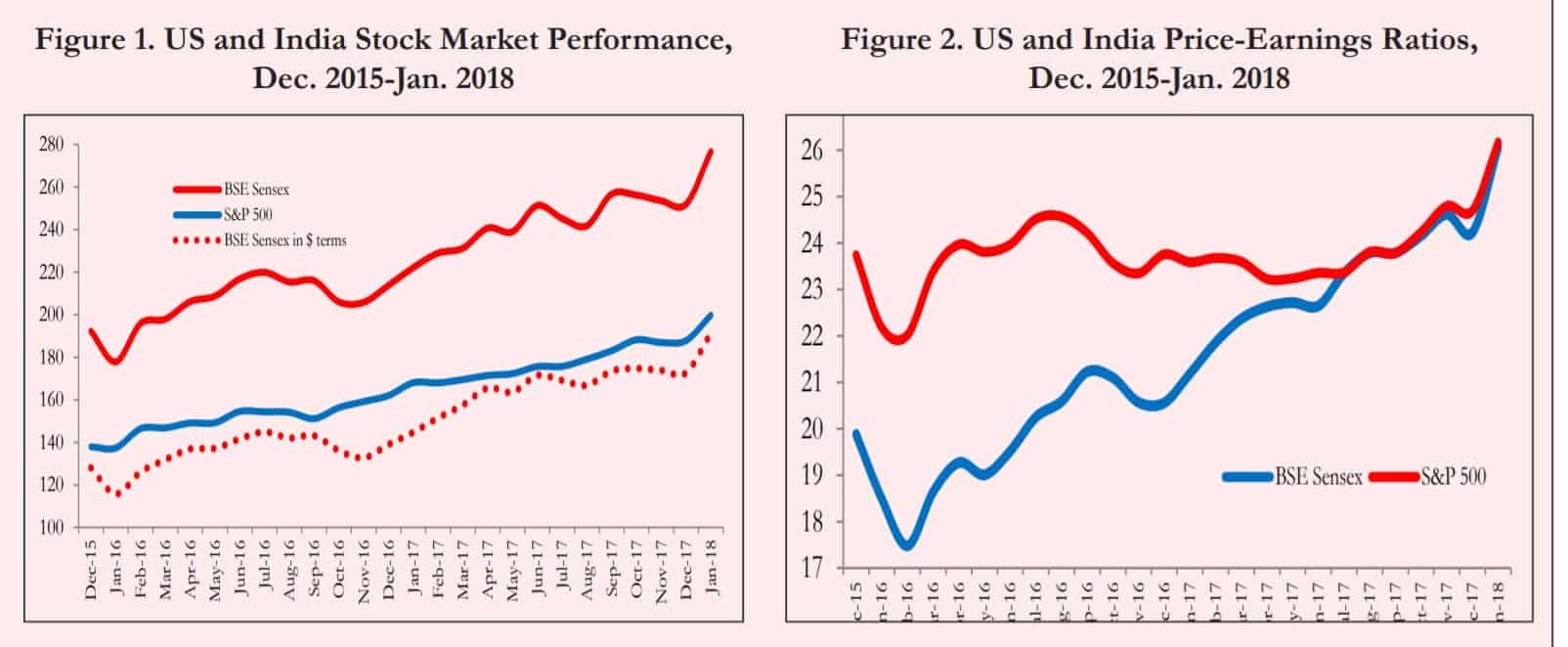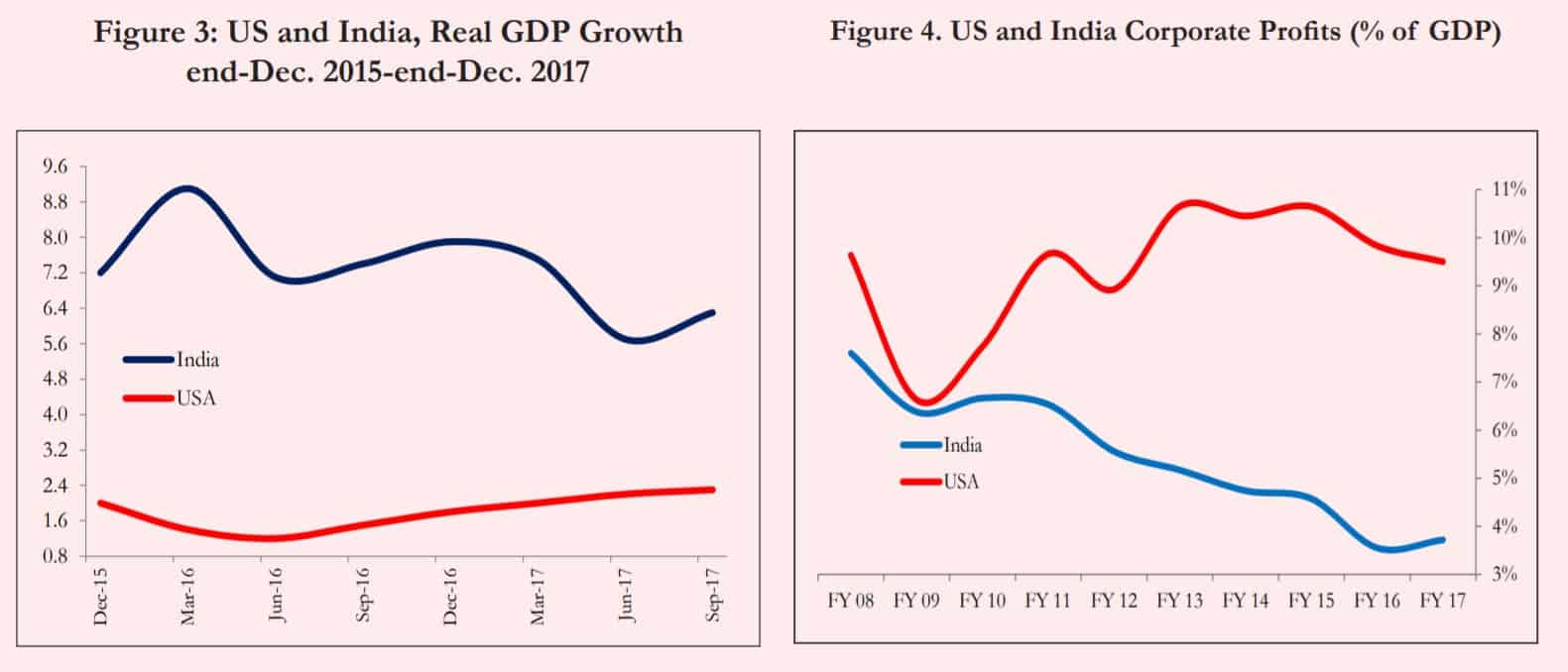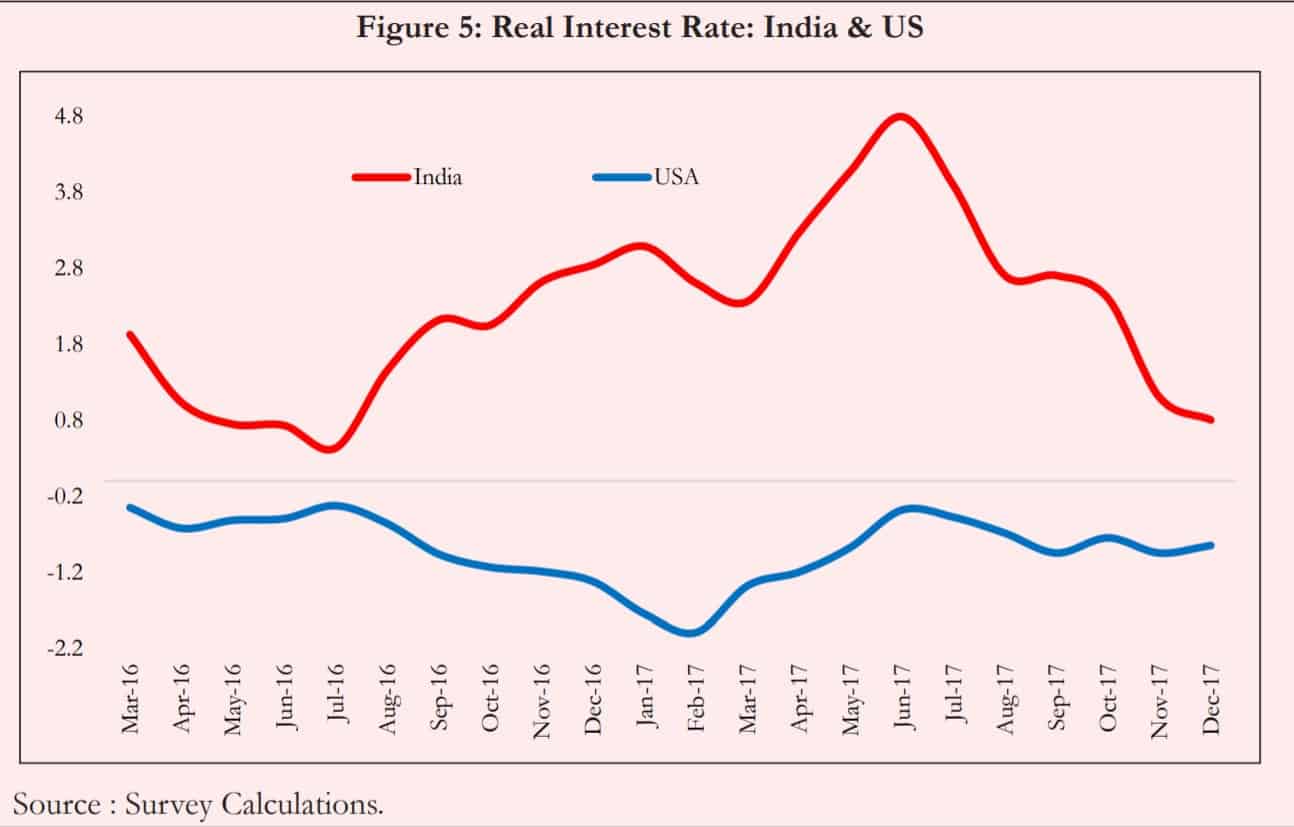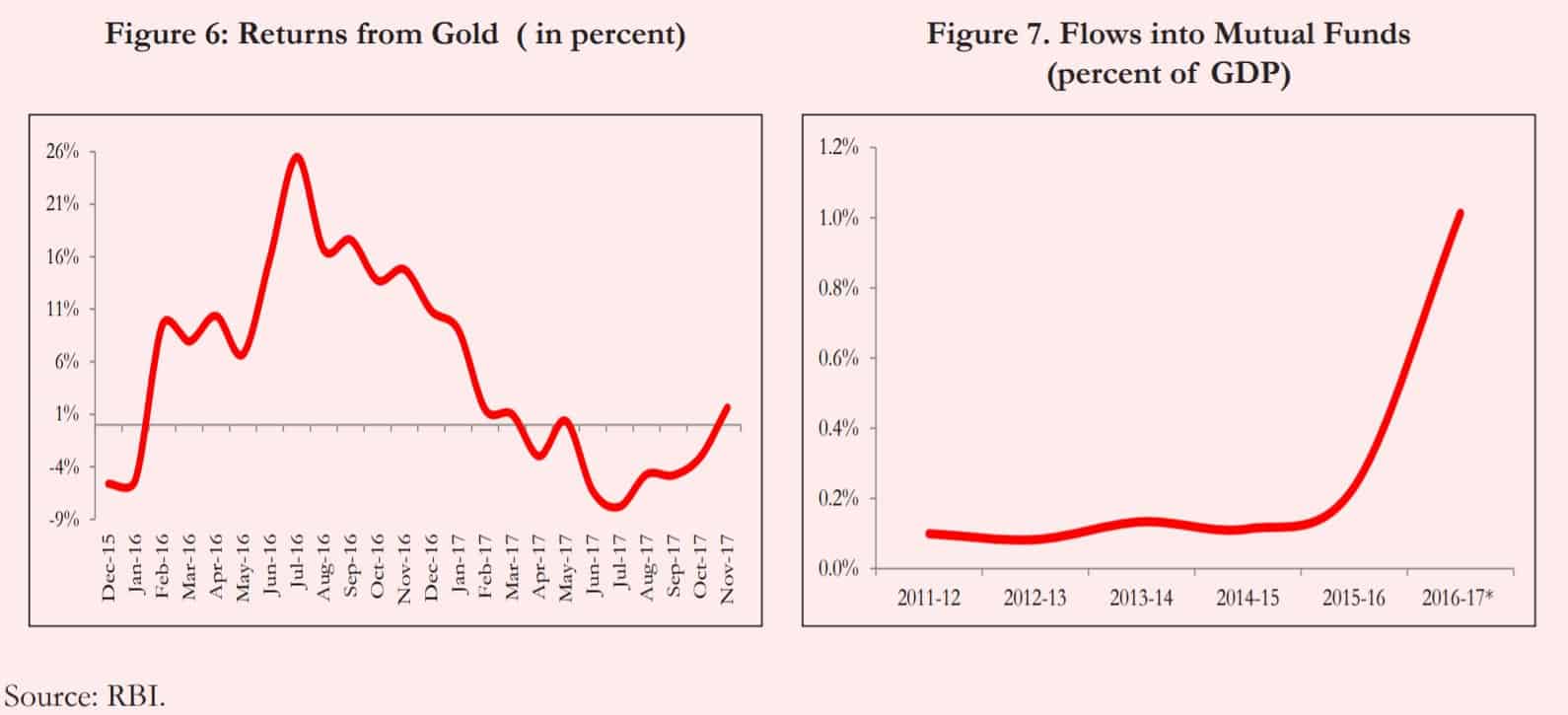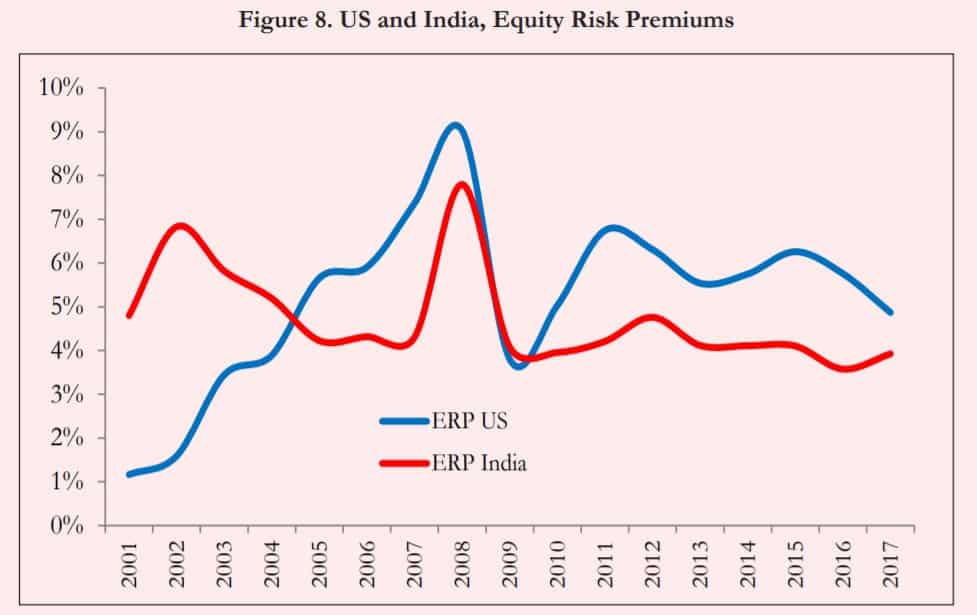Last Updated on December 28, 2021 at 6:28 pm
The Economic Survey 2017-2018 was published yesterday with a clear warning that the stock market valuations are too high and unless earnings increase, a correction should be expected. The survey also argued that the bond market seems to have forgotten about the growth in the national small savings fund. Amidst the euphoria about increased GDP growth projections, this warning should be kept in mind. The economic survey can be downloaded from here.
Economic Survey 2017-2018 on bond markets
In box 8 of chapter 1, titled, “Do Government Market Borrowings Reflect the Underlying Fiscal Deficit?”, the survey explains why the sharp increase in the 10Y G-sec yield (resulting in a fall of long-term gilt and dynamic bond funds) is not backed by reason. The survey argues that the bond market seems to fear (1) the issue of new gilts to handle the fiscal deficit (which it believes to be higher than documented) and (2) higher inflation (which is reasonable). The sudden increase in yield curve is a result of this.
It adds: “Another factor contributing to the rise in bond yields has been stepped-up Open Market Operations (OMO) by the RBI. This amounted to a net sale of about Rs. 90,000 crores during April-December 2017-18 (compared to a net redemption of Rs. 1.1 lakh crores during the same period in 2016-17).”
The yield curve is a plot of bond yields vs duration. The curves shown are above where the longer duration bonds have higher yields is known as “normal yield curves”. Read more: The Bond Yield Curve as an indicator of what’s going on with the economy
Join 32,000+ readers and get free money management solutions delivered to your inbox! Subscribe to get posts via email! (Link takes you to our email sign-up form)

🔥Want to create a complete financial plan? Learn goal-based investing? Exclusive access to our DIY tools? Increase your income with your skills? Use this link to enjoy massive discounts on our robo-advisory tool & courses! 🔥
The survey points out that the bond market has forgotten that
Net Market Borrowings = Fiscal Deficit- NSSF net flows
Where NSSF is the National Small Savings Fund where PPF, SSY, SCSS, NSC, KVP, MIS, TD, PO-SB contributions go. This has seen a sudden spike in contributions.This is because after demonetization, the NSS schemes have relatively better returns and better tax treatment (PPF, SSY).
Therefore, there is no need for the central government to issue more bonds to handle the fiscal deficit. It has enough funds in the NSSF.
As explained in the evolution of Public Provident Fund (PPF) Interest Rates, the state governments borrow from the small savings fund at about 2% higher interest than the rate offered to us! Therefore to decrease their spending, they preferred to issue more bonds rather than borrow from the NSSF. You can see the central borrowing has come down, while the state borrowing has increased sharply.
The bond market has incorrectly interpreted higher state borrowing as due to higher deficits. This is incorrect. The states are merely trying to borrow at a lower rate by issuing more bonds.
Economic Survey 2017-2018 on stock markets
The survey shows that although the US and Indian markets have increased by similar amounts since Dec 2015 and now have similar price-earnings ratios, the underlying reasons for the increase are quite different.
Economic growth in the US has increased, justifying its stock market increase. Whereas in India, the economic growth has decreased.
In addition, the real interest rates are very different. The real rate is the savings interest rate after accounting for inflation
1 + real-rate = (1+ interest-rate) x (1+ inflation-rate)
Lower real interest rates imply business can borrow easily. In India, the rate is high, therefore more savings and less consumption, meaning, less corporate profits and therefore fewer stock earnings. So the stock market should be reflected that by not increasing so much. This means that
1: it will wait for earnings to catch up and 2: if they don’t, if oil prices remain high, if FIIs pull out, if local interest rates increase, it will correct sharply. The economic survey states this quite clearly. That is a lot of ifs there, but to quite the chief economic advisor (see presentation below): “only the paranoid survive”. (After Andrew Groves book by the same name)
Why is the Indian stock market zooming up?
1: Investors purchased in the hope that a strong government will result in corporate earnings. As noted by me time and time again, this has not happened:
Nifty Valuation Analysis with PE, PB, Div Yield, ROE, EPS of 21 NSE Indices (Feb 2017)
Nifty Valuation Charts Nov 2016: PE, PE, Div Yield, ROE, EPS Growth (Oct 2016)
Nifty Valuation Charts: Dec 2015 (Dec 2015)
2: Post demonetization, with falling interest rates and poor returns from gold, investors turned to equity and equity mutual funds for better returns. Since the risk-free rates decreased, the extra returns that equity must provide for the risk rake ( equity risk premium – ERP) also fell.
Equity risk premiums of US and Indian markets. See footnote on page 30 for details of calculation. This is a simple definition
Equity Risk Premium = Expected return on stocks – risk-free-rate
The survey says:
Does this imply that Indian P/E ratios have reached a higher “new normal”? Perhaps. It’s possible that the portfolio shift
set in train by the campaign against illicit wealth will result in a sustained reduction in the ERP. But it is worth recalling
that a similar assessment was made in the US after its ERP fell sharply in the late 1990s-early 2000s. A few years later, the
technology bubble collapsed, then the Global Financial Crisis occurred. The ERP surged to new heights and still hasn’t
reverted to its previous trough.
Beyond ERPs, sustaining current stock valuations in India also requires future earnings performance to rise to meet stillhigh
expectations. And this outlook, in turn, depends on whether a significant economic rebound is this time well and truly
around the corner
Thus the survey opines that high valuations are not justified and
sustaining these valuations will require future growth in the economy and earnings in line with current expectations,
and require the portfolio re-allocation to be semi-permanent. Otherwise, the possibility of a correction in them cannot be
ruled out.
Should I be worried?
“Would it help?” (guess the movie!)
What should I do?
The Economic survey has only stated the obvious to those who had their feet on the ground. The market cannot keep increasing without any sign of corporate earnings. So it would either wait (sideways movement) or fall sharply if the FIIs pull out or if the Indian savers switch to fixed income when RBI increases rates. So
1: Lower expectations from equity. The high returns you have got will eventually decrease, as sure as night follows day.
2: If your goal is several years away, do nothing.
3: If your goal is around the corner, you should not be in equity anyway! Round the corner here means within next 5 years (yeah 5 years is short-term). Why? because returns depend on market increase and time (more on this soon – we often forget about time)
4: Do not fall prey to BS from sales guys about high GDP growth, Indian shining etc. and ignore your asset allocation.
5: If you want to reduce the risk of a sharp correction, read more about tactical asset allocation models and implement it (easier said than done!)
Economic Survey 2017-2018 Presentation by the chief economic Advisor, Dr. Arvind Subramanian
Reference
Chapter 1 Economic Survey of India 2017-2018

Use our Robo-advisory Tool to create a complete financial plan! ⇐More than 3,000 investors and advisors use this! Use the discount code: robo25 for a 20% discount. Plan your retirement (early, normal, before, and after), as well as non-recurring financial goals (such as child education) and recurring financial goals (like holidays and appliance purchases). The tool would help anyone aged 18 to 80 plan for their retirement, as well as six other non-recurring financial goals and four recurring financial goals, with a detailed cash flow summary.
🔥You can also avail massive discounts on our courses and the freefincal investor circle! 🔥& join our community of 8000+ users!
Track your mutual funds and stock investments with this Google Sheet!
We also publish monthly equity mutual funds, debt and hybrid mutual funds, index funds, and ETF screeners, as well as momentum and low-volatility stock screeners.
You can follow our articles on Google News

We have over 1,000 videos on YouTube!

Join our WhatsApp Channel



- Do you have a comment about the above article? Reach out to us on Twitter: @freefincal or @pattufreefincal
- Have a question? Subscribe to our newsletter using the form below.
- Hit 'reply' to any email from us! We do not offer personalised investment advice. We can write a detailed article without mentioning your name if you have a generic question.
Join 32,000+ readers and get free money management solutions delivered to your inbox! Subscribe to get posts via email! (Link takes you to our email sign-up form)
About The Author
 Dr M. Pattabiraman (PhD) is the founder, managing editor and primary author of freefincal. He is an associate professor at the Indian Institute of Technology, Madras. He has over 13 years of experience publishing news analysis, research and financial product development. Connect with him via Twitter(X), LinkedIn, or YouTube. Pattabiraman has co-authored three print books: (1) You can be rich too with goal-based investing (CNBC TV18) for DIY investors. (2) Gamechanger for young earners. (3) Chinchu Gets a Superpower! for kids. He has also written seven other free e-books on various money management topics. He is a patron and co-founder of “Fee-only India,” an organisation promoting unbiased, commission-free, AUM-independent investment advice.
Dr M. Pattabiraman (PhD) is the founder, managing editor and primary author of freefincal. He is an associate professor at the Indian Institute of Technology, Madras. He has over 13 years of experience publishing news analysis, research and financial product development. Connect with him via Twitter(X), LinkedIn, or YouTube. Pattabiraman has co-authored three print books: (1) You can be rich too with goal-based investing (CNBC TV18) for DIY investors. (2) Gamechanger for young earners. (3) Chinchu Gets a Superpower! for kids. He has also written seven other free e-books on various money management topics. He is a patron and co-founder of “Fee-only India,” an organisation promoting unbiased, commission-free, AUM-independent investment advice.Our flagship course! Learn to manage your portfolio like a pro to achieve your goals regardless of market conditions! ⇐ More than 3,500 investors and advisors are part of our exclusive community! Get clarity on how to plan for your goals and achieve the necessary corpus no matter the market condition!! Watch the first lecture for free! One-time payment! No recurring fees! Life-long access to videos! Reduce fear, uncertainty and doubt while investing! Learn how to plan for your goals before and after retirement with confidence.
Increase your income by getting people to pay for your skills! ⇐ More than 800 salaried employees, entrepreneurs and financial advisors are part of our exclusive community! Learn how to get people to pay for your skills! Whether you are a professional or small business owner seeking more clients through online visibility, or a salaried individual looking for a side income or passive income, we will show you how to achieve this by showcasing your skills and building a community that trusts and pays you. (watch 1st lecture for free). One-time payment! No recurring fees! Life-long access to videos!
Our book for kids: “Chinchu Gets a Superpower!” is now available!


Must-read book even for adults! This is something that every parent should teach their kids right from their young age. The importance of money management and decision making based on their wants and needs. Very nicely written in simple terms. - Arun.Buy the book: Chinchu gets a superpower for your child!
How to profit from content writing: Our new ebook is for those interested in getting a side income via content writing. It is available at a 50% discount for Rs. 500 only!
Do you want to check if the market is overvalued or undervalued? Use our market valuation tool (it will work with any index!), or get the Tactical Buy/Sell timing tool!
We publish monthly mutual fund screeners and momentum, low-volatility stock screeners.
About freefincal & its content policy. Freefincal is a News Media organisation dedicated to providing original analysis, reports, reviews and insights on mutual funds, stocks, investing, retirement and personal finance developments. We do so without conflict of interest and bias. Follow us on Google News. Freefincal serves more than three million readers a year (5 million page views) with articles based only on factual information and detailed analysis by its authors. All statements made will be verified with credible and knowledgeable sources before publication. Freefincal does not publish paid articles, promotions, PR, satire or opinions without data. All opinions will be inferences backed by verifiable, reproducible evidence/data. Contact Information: To get in touch, please use our contact form. (Sponsored posts or paid collaborations will not be entertained.)
Connect with us on social media
- Twitter @freefincal
- Subscribe to our YouTube Videos
- Posts feed via Feedburner.
Our publications
You Can Be Rich Too with Goal-Based Investing
 Published by CNBC TV18, this book is designed to help you ask the right questions and find the correct answers. Additionally, it comes with nine online calculators, allowing you to create custom solutions tailored to your lifestyle. Get it now.
Published by CNBC TV18, this book is designed to help you ask the right questions and find the correct answers. Additionally, it comes with nine online calculators, allowing you to create custom solutions tailored to your lifestyle. Get it now.Gamechanger: Forget Startups, Join Corporate & Still Live the Rich Life You Want
 This book is designed for young earners to get their basics right from the start! It will also help you travel to exotic places at a low cost! Get it or gift it to a young earner.
This book is designed for young earners to get their basics right from the start! It will also help you travel to exotic places at a low cost! Get it or gift it to a young earner.Your Ultimate Guide to Travel
 This is an in-depth exploration of vacation planning, including finding affordable flights, budget accommodations, and practical travel tips. It also examines the benefits of travelling slowly, both financially and psychologically, with links to relevant web pages and guidance at every step. Get the PDF for Rs 300 (instant download)
This is an in-depth exploration of vacation planning, including finding affordable flights, budget accommodations, and practical travel tips. It also examines the benefits of travelling slowly, both financially and psychologically, with links to relevant web pages and guidance at every step. Get the PDF for Rs 300 (instant download)